A Long Time Ago, in an Opera House Far, Far Away….
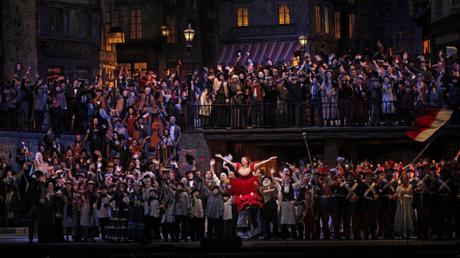 Finale to Café Momus scene, Act II of La Boheme at the Met
Finale to Café Momus scene, Act II of La Boheme at the Met
Welcome, opera fans, to the 2015-2016 Metropolitan Opera broadcast season! Did you miss those radio, online streaming, and/or Live in HD transmissions of your favorite works? No? Well, we sure did! As a matter of fact, this is the 84th consecutive season of Met Opera performances to be broadcast live for the pleasure of opera lovers everywhere and throughout the U.S., Canada, Mexico, and Europe.
Today, satellite feeds relay the experience to such faraway spots as Brazil, Australia, South Africa, China, and beyond. And I’ve been a steadfast and unswervingly loyal listener to the Met Opera broadcasts for over half that time. You can’t beat a record like that for consistency, now, can you?
The new season will feature only the fourth host in its long history. Prior to the previously announced Mary Jo Heath, who for the past ten years has served as the program’s senior producer, there were the redoubtable Milton Cross (1931-1975), Peter Allen (1975-2004), and Margaret Juntwait (2004-2014) to contend with. With a master’s thesis behind her that delved into the minutiae of Puccini’s Madama Butterfly, and a PhD dissertation from the Eastman School of Music that contrasted Bartók’s Bluebeard’s Castle with Paul Dukas’ Ariane et Barbe-Bleue (French for “Bluebeard”), the evidently knowledgeable Mary Jo Heath is well equipped to take on the challenges that hosting live opera can pose.
With a seemingly endless repertoire of facts, figures, useless trivia, and historical lore to entertain and amuse listeners, the eager and ever-smiling Ira Schiff returns to fulfill his main role as Ms. Heath’s gushing co-host and commentator. Music producer Jay David Saks is back, as well as veteran producers Ellen Keel and William Berger. The series is executive produced by Mia Bongiovanni (now THERE’S an operatic name if I’ve ever heard one!) and Elena Park.
There is also a periodical called Opera News (published monthly by the Metropolitan Opera Guild) that acts as a sort of guide to the weekly Saturday broadcasts. In addition, the print version of the magazine has undergone an extreme makeover that caters to the tastes of younger opera-goers than to us old timers. Copious photos of aspiring young artists line its information-packed pages, along with reviews from local and international venues, as well as fluff pieces suggesting to readers what to eat, where to travel, and who to watch for in which opera.
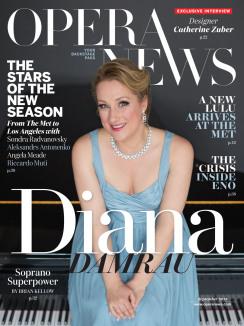
Certainly, the present look and feel of Opera News resembles that of an online podcast, which it may very well become in the foreseeable future. Yes, the tell-tale signs that the youth market now dominates the day are everywhere — even in the high-cultured world of opera. I wonder, though, if there is any truth behind the purported pandering and advertising tactics described above.
I have noticed that orchestra members are indeed getting younger, with more and more women players participating than ever before. That’s certainly something to cheer about!
However, the undeniable irony of opera is that it takes a long time for voices to ripen and mature. Much like the finest wines, age can be a blessing or a curse to the best of performers. Still, veterans can boast of reliability on their hard-earned experience to overcome temporary vocal problems. It’s a fact of operatic life that established pros with rock-solid techniques can oftentimes weather these storms better than, say, those who have yet to encounter such difficulties.
As in any sport, relying on the aid and advice of good teachers, skilled vocal coaches or sympathetic stage directors can make the difference between success and failure, thus helping to turn boos into bravos when the time inevitably arrives to face such matters.
A Bohème with Something to Boast About
The radio season kicked off on December 5 with that perennial holiday attraction, Puccini’s La Bohème. The broadcast starred Italian diva Barbara Frittoli as Mimì, Mexican tenor Ramón Vargas as the poet Rodolfo, Puerto Rican soprano Ana María Martínez as Musetta, Rumanian baritone Levente Molnár as the painter Marcello, Russian baritone Alexey Lavrov as the musician Schaunard, the Rockville Centre bass-baritone Christian van Horn as the philosopher Colline, and American buffo John Del Carlo as Benoit/Alcindoro. The performance was presided over by Milanese conductor Paolo Carignani, who will also be conducting two other Puccini works at the Met, Tosca and Turandot.
If I had to describe this piece to the casual listener, I would say that La Bohème epitomizes all that is unique and characteristic of what we call “opera.” After years of studying the work and marveling at its musical pleasures, one can only add that music lovers often refer to it as the “perfect” opera. It’s short and it’s sweet; it’s comic and it’s dramatic; it’s funny and it’s sad, and ultimately tragic.
There are gently poetic turns by those involved as well as full-blown operatic ones. For example, a huge chorus in Act II and some lovely set pieces in the outlying acts; a bevy of memorable tunes, an orchestral tone poem at the start of Act III, and two (count ‘em) two lovesick couples to root for. What more can one ask? Oh, and it takes place on Christmas Eve.
Domestic opera companies from the Metropolitan and Chicago Lyric to San Francisco’s War Memorial Opera House have boasted opulent visuals and eye-popping production values every time they bring this work to the fore. I’m all for lavish scenery and costumes (if and when they are called for), but over the years I’ve grown to accept the fact that despite its reputation as a bustling crowd-pleaser, La Bohème is at heart an intimate drama.
There are attractive and rewarding parts both for the would-be novice and the reputable veteran. In the right hands, they can melt an audience’s heart. Two such parts are the poet Rodolfo and the seamstress Mimì. He is the archetypal romantic lead, while she can be as delicate as a flower — and just as fragile, given that from the start she’s afflicted with tuberculosis.
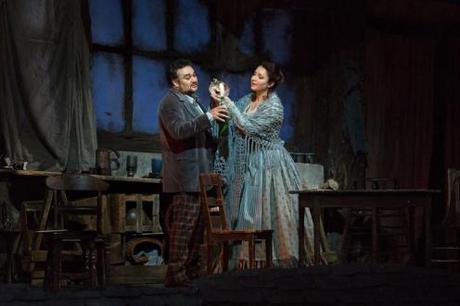
Far from being a “goody-two-shoes,” Mimì is a passionate, loving individual who craves attention, if not so openly as her counterpart, the vivacious Musetta. In one of the discarded scenes from Mürger’s novel that Puccini insisted be excised, so desperate is she to be loved and cared for (but wary of Rodolfo’s jealous outbursts) that she leaves Rodolfo to take up with a wealthy viscount (oh, Mimì, how could you?).
Their Act I “meet cute” (Hollywood-speak for their initial encounter) is surely one of the most touching instances of operatic love-at-first-sight to be found anywhere. Only in opera can young people bawl at each other in full voice and declare their undying affection (they don’t even kiss until later — well, in most productions, anyway). In my mind’s eye, I would prefer to see them slowly but carefully get to know one another through mutual self-discovery.
An example of what I mean is Mimì’s first aria, “Sì, mi chiamano Mimì, ma il mio nome è Lucia” (“Yes, they call me Mimi, but my real name is Lucy”). This is the latter half of their getting-to-know-you session, after Rodolfo’s admission in his introductory solo “Che gelida manina” that he has the soul of a millionaire (“L’anima ho milionaria”), even though he’s as poor as sin. He goes on to wax poetic about her enchanting eyes that have robbed him of whatever riches he once possessed (“Ruban tutti gioielli, due ladri gli occhi belli”). Soaring to a high C (not held, by the way, but indicated in the score with a fermata), Rodolfo tells her that the theft does not bother him. In fact, it has given him renewed hope (just like a poet to say that!).
Responding to his request to tell him about herself, Mimì begins her “brief story.” Gradually and shyly at first, she is guarded in her choice of words (actually, those of the librettist Giacosa), but ultimately reveals to Rodolfo what she likes to do (“I embroider”) and how she spends her time. She even admits to liking things that have poetic names. “Lei m’intende?” – “You get my drift?” Mimì asks him, quizzically. Rodolfo’s one word answer is: “Sì.” Well, of course he understands: he’s a poet, isn’t he?
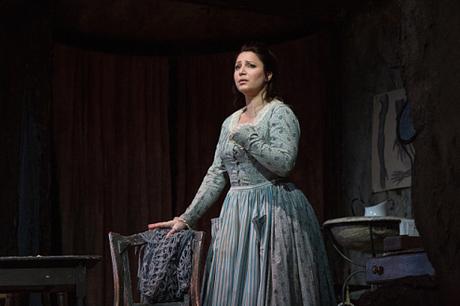
This brief semi-sung passage inside an aria reflects Puccini’s masterly use of parlando — that is, of speaking in short bursts of pointed phrases. It takes the place of the previous generation’s overuse of recitative before the aria proper. What Puccini does here is mimic real conversation between two obviously attracted individuals by wrapping their exchanges in a musical structure that allows both for the advancement of plot and the expression of each character’s innermost thoughts and desires.
About halfway into her scene, Mimì repeats the opening line, “Yes, they call me Mimi,” then appends it with a questioning, “And why? I don’t know.” In her nervousness, her mind starts to wander, flitting from one subject to the other: “Alone, I make my lunch. I don’t always go to Mass, but I pray every day to the Lord.” This is as natural an expression of normal speech as any I can think of. “I live all by myself,” she insists, a fairly brazen admission to a complete stranger. But remember, this is an opera.
Mimì then goes on to describe her little white room where she looks out onto the roofs and sky. It’s an unmistakable reference to Rodolfo’s first line in the opera, “Nei cieli bigi guardo fumar dai mille comignoli Parigi” (which translates to “I’m watching the thick gray smoke rise up from the thousands of Parisian chimneys”), the purpose being that these two lonely yet vibrant youngsters share a similar tedious lifestyle amid the deprivations of the Latin Quarter, the bohemian-like Greenwich Village of its day. But they each manage to draw sustenance from the tedium that makes them hopeful for better days.
At this point in my ideal production, Mimì takes a breath and slowly rises to her feet upon saying the line, “Ma quando vien lo sgelo” – “But when the spring thaw arrives, the first rays of sun are mine. The first kiss of April is mine.” She embraces herself with her arms, cuddling to keep the warmth from escaping; her hands reach up to touch her face in a gesture that expresses her yearning for the sun’s life-giving rays. Intuitively, Mimì knows she is dying, even at this early stage (a lost opportunity that many singers and directors fail to take hold of). Her eyes are closed as she sings, which allows her to expose her true feelings of holding on to the moment — and to dear life — through voice alone.
This highly emotional outburst is so typical of Puccini, and so typical of the tender loving care he lavished on his female characters. It’s also one of this opera’s most exhilarating moments, one I hold my own breath for. My only wish is that more conductors would allow the singers to draw the line out a bit longer than they normally do. It sustains the air of anticipation, of a moment frozen in time that may never return.
At last, she opens her eyes, only to notice her drab surroundings. Realizing she is back in Rodolfo’s garret, Mimì reverts to twittering about flowers. “But the ones I make have no fragrance,” she distractedly sighs. She ends her reverie with a rapidly uttered apology for not having anything more to say about herself and for being a bothersome neighbor. Surprisingly, her and Rodolfo’s autobiographical depictions end not with bluster but with softness, an indication of their sweet, ruminative natures. Ah, young love! If only they knew what troubles lay ahead of them…
And if the broadcast performance on December 5 had more of this kind of unfettered joy and life-affirming intimacy that La Bohème clearly calls for, it might have been a truly remarkable one at that. Sadly, the impression I got was of a routine, by-the-numbers program that was sorely lacking in that punch to the gut that only the best performances (and performers, to be perfectly blunt about it) can provide.
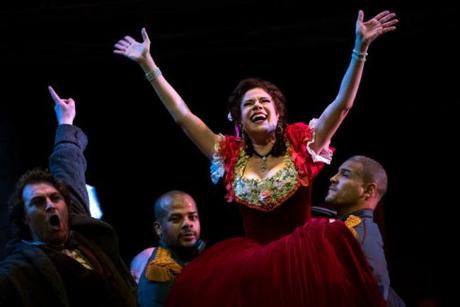
Even with the sort of cast that most opera companies would die for, Frittoli’s Mimì was thin and colorless of tone, Vargas’ Rodolfo (who took his “Che gelida manina” down a semitone) was strained and effortful, while the other cast members, including a frayed Del Carlo as a blustery cliché-driven Benoit and Alcindoro, and a far-from-elegant Schaunard by the wavery-voiced Lavrov, simply could not make up for the slack left by the two leads.
Molnár’s strong-willed Marcello and Martínez’s flighty, keenly-observed Musetta tried their best to liven things up, but the vocal chemistry and ensemble effort this work demands simply wasn’t there. Maestro Carignani added little to the general ho-hum environment.
At the least, chorus master Donald Palumbo’s Met Opera chorus was up to snuff, salvaging what little they could of the afternoon’s proceedings. It is an absolute pleasure to hear these excellent choristers prove their mettle each and every time. Bravi, bravi!!!
Verdi and Rossini at Their Finest
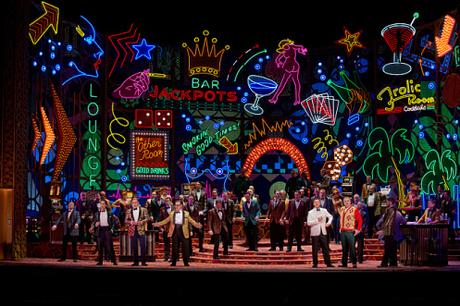
December 12 brought Verdi’s Rigoletto back to the airwaves, in director Michael Mayer’s glitzy Las Vegas-style adaptation. Once again, the performance was anchored by Željko Lučić as the Don Rickles-like tragicomic Rigoletto. Debuting soprano Nadine Sierra sang his daughter Gilda, tenor Piotr Beczala returned as the lascivious Duke of Mantua (a Frank Sinatra-type in this mounting), Nancy Fabiola Herrera was the hooker Maddalena, and Dimitry Ivashchenko was her hit-man brother, Sparafucile. Maestro Roberto Abbado led the wonderful Met Opera orchestra.
As readers of my blog are aware, I was thoroughly bowled over by this updated version of the opera when it first premiered, which is similar, in many respects, to an earlier production by Jonathan Miller for the English National Opera (from the 1980s) that set the story in New York’s mob-controlled Little Italy. One striking element from that staging was the third act scene where the “Duke,” a gangland boss, put a coin in the slot of an old jukebox in Sparafucile’s hideaway that went on to play a 45-rpm recording of “La donna è mobile” — a novel touch, if I do say so.
The afternoon’s performance suddenly caught fire with Ms. Sierra’s superbly delivered, excellently acted and articulated Gilda. Still only in her twenties, Sierra’s coloratura fireworks, in the virginal aria “Caro nome,” and her bold entreaties to her father in Act II ignited this production every time she appeared on stage, so much so that it bolstered the confidence of the other participants in outdoing each other. For instance, Beczala never sounded better as the ribald, all-or-nothing-at-all Duke, clearly in the Sinatra mold.
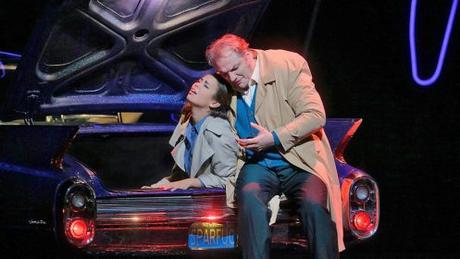
Nadine’s effervescence even livened up the put upon hunchback of baritone Lučić, whose gnarly line and muscular tone can be torture to the ears at times. However, he overcame the title role’s treacherously high tessitura with a sympathetic and rousing portrayal of the jester.
In his earlier assumption of the part when this production was still new, Lučić merely avoided the alternate unwritten high notes that end the opera; but here, he threw caution to the winds and let out a long-held howl of despair at his daughter’s murder that lowered the curtain on this despondent character’s tribulations. Not for nothing was Rigoletto’s original incarnation (in Victor Hugo’s play) called Triboulet.
Moving on to the bel canto realm, the December 19 broadcast reintroduced listeners to Gioachino Rossini’s 1819 drama La Donna del Lago (“The Lady in the Lake”) in the production by Paul Curran, with Joyce DiDonato as Elena, Daniela Barcellona in the trouser role of Malcolm, the spectacular Lawrence Brownlee as Giacomo (or James) V, John Osborn as Rodrigo, and Oren Gradus as Duglas. The conductor was the resourceful Michele Mariotti.
The opera is based on a romantic poem by Sir Walter Scott, the same author who later had fired Donzietti’s imagination with his 1835 opera Lucia di Lammermoor. It’s a 16th-century tale of knights and damsels in distress set in the Scottish highlands. The difference being that everyone warbles in Italian! Mamma mia!
I’m not the biggest fan of Rossini’s tragedies: they all sound like comedic romps to me, no matter how stark or dramatic the subject matter. His overtures are world renowned and show a depth of understanding and mastery of the form like no other. Musicologists and historians have gone on record as claiming that Rossini wrote nearly 40 operatic works, with an almost equal distribution of comic and tragic pieces. Only his contemporary Donizetti surpassed him with a back-breaking 60 works to his credit.
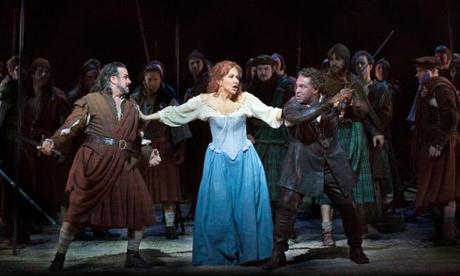
Thankfully, La Donna del Lago provides ample opportunities for both protagonists and antagonists to display their coloratura wares, as it were. All the above participants were enjoyable and thoroughly reliable, with the amazing Lawrence Brownlee taking top vocal honors in an unbelievable demonstration of agility and control, along with astounding high notes and coloratura dexterity in alt. Brownlee will be appearing soon on a PBS broadcast of the annual Richard Tucker Gala. This warrants a not-to-be-missed disclaimer for his fans!
On that same PBS telecast will be adult-oriented pop sensation Andrea Bocelli singing Lionel’s popular “M’appari, tutt’amor” aria from Flotow’s Martha. From what I heard of his portion of the program, Bocelli has a long way to go in the operatic sweepstakes to please this listener’s discerning ears and tastes. I find his wavery attempts at a clear legato line and his choppy, broken phrasing distracting in the extreme. He should leave well enough alone and let experts like the superbly-gifted Brownlee, not to mention the incredibly flexible Joyce DiDonato, do their “thing” in operatic circles.
Copyright © 2016 by Josmar F. Lopes

